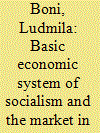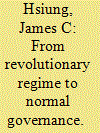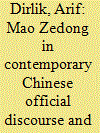| Srl | Item |
| 1 |
ID:
189305


|
|
|
|
|
| Summary/Abstract |
The recognition by the Chinese academic community of the commodity economy's right to exist in a planned economy, as well as the possibility of market development under socialism, was a major breakthrough in the history of Marxism. Socialism in conjunction with the market marked the beginning of the formation of the socialist market economy system in the PRC and the development of a mixed economy. In addition, the principle of "public ownership as the basis for the joint development of economies of multiple forms of ownership" was named as the basic economic system of the country at the initial stage of socialism development. Today, it is officially called one of the most important advantages of the system of socialism with Chinese characteristics. It is this advantage, according to China, that has enabled high rates of economic growth and made the country one of the world's leading economies. But this unique feature and advantage of socialism with Chinese characteristics can be manifested and realized only within a certain coordinate system - namely, an overarching system of state administration in which the basic economic system is responsible for managing the development of the country's economy at the institutional level.
|
|
|
|
|
|
|
|
|
|
|
|
|
|
|
|
| 2 |
ID:
087882


|
|
|
| 3 |
ID:
113766


|
|
|
|
|
| Publication |
2012.
|
| Summary/Abstract |
Rather than repudiate Mao's legacy, the post-revolutionary regime in China has sought to recruit him in support of "reform and opening." Beginning with Deng Xiaoping after 1978, official historiography has drawn a distinction between Mao the Cultural Revolutionary and Mao the architect of "Chinese Marxism" - a Marxism that integrates theory with the circumstances of Chinese society. The essence of the latter is encapsulated in "Mao Zedong Thought," which is viewed as an expression not just of Mao the individual but of the collective leadership of the Party. In most recent representations, "Chinese Marxism" is viewed as having developed in two phases: New Democracy, which brought the Communist Party to power in 1949, and "socialism with Chinese characteristics," inaugurated under Deng Xiaoping and developed under his successors, and which represents a further development of Mao Zedong Thought. The Hu Jintao leadership has made an aggressive effort to portray "Chinese Marxism" as the most advanced development of Marxism that might also serve as a model for others. These interpretive operations have salvaged Mao for the national revolution and the legitimacy of the Communist Party. But it also presents a predicament in keeping alive memories of Mao's policies, which the Party is not always able to control in political memory, as has been illustrated most recently in the Chongqing experiment.
|
|
|
|
|
|
|
|
|
|
|
|
|
|
|
|
| 4 |
ID:
183133


|
|
|
|
|
| Summary/Abstract |
The Communist Party of China (CPC) completed 100 years of its existence in July 2021, with the last 70 plus years spent as the ruling party in China. The centenary occasioned a fresh consideration by the CPC of the challenges to its identity, legitimacy and power. Using select speeches and commentaries produced by the CPC in the context of the centenary, this article analyses how the Party deploys discourses on its history to articulate its concerns and promote its interests today. It also looks at how these interpretations of the Party’s history and role in China translate into a growing sense of exceptionalism in the Party-state. The article argues that despite frequent calls to ‘seek truth from facts’, an overriding desire to retain power is once again pushing the CPC down the path towards dogmatism.
|
|
|
|
|
|
|
|
|
|
|
|
|
|
|
|